Oct. 30, 2020
We asked Pittsburgh-area kids, their parents and experts what they make of this election.
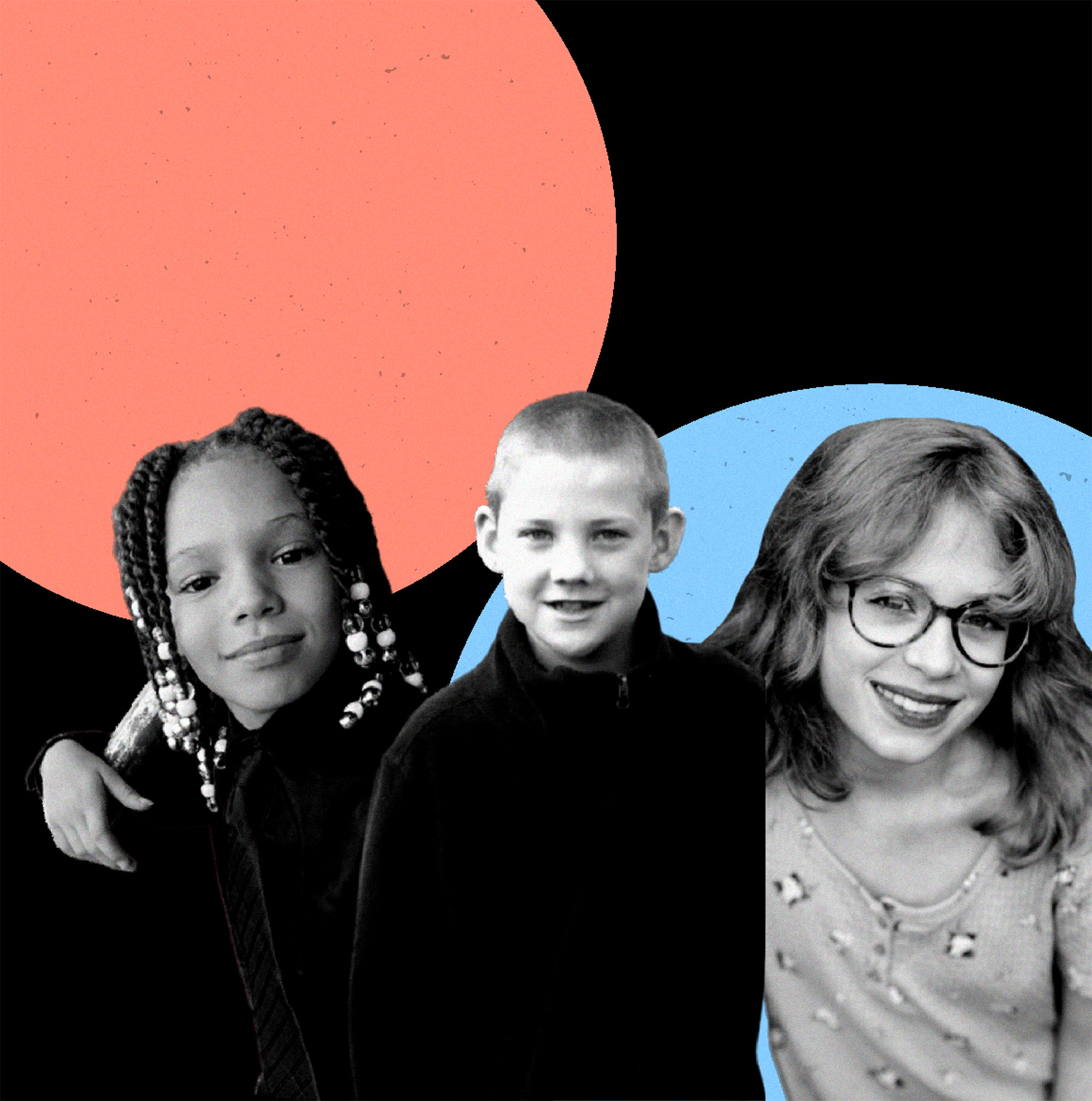
Oct. 30, 2020

Oct. 30, 2020

If the political climate of the United States is confusing for adults, imagine how staggeringly overwhelming it is for children.
How exactly are local kids understanding this election? We asked them directly. Their answers were surprising — even to some of their parents, who we asked to interview their kids on how they are feeling. The children had a wide range of views and beliefs, and different levels of understanding about the platforms of President Donald Trump and former Vice President Joe Biden. We also spoke to their parents and several experts in the field to provide a window into how children are processing the 2020 election.
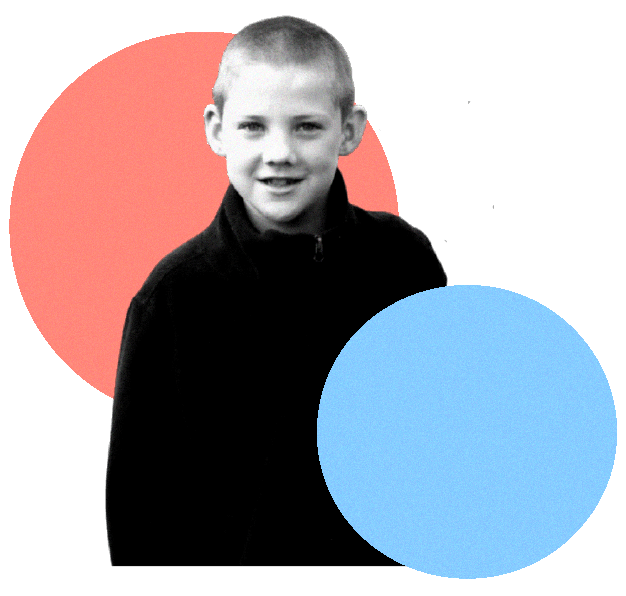
Travis, 10, Slippery Rock
Travis lives with his 12-year-old brother and parents just outside of Slippery Rock. They are an active foster family, so there are often several other little ones in their house at any given moment. Travis loves to play with his goats and cats, and is an avid Harry Potter fan. He loves to build with Legos. Travis’ school has gone back full-time this fall, so he spends a lot of time with friends.
Travis has been paying close attention to the political talks around him. He knows his parents both plan to vote for Trump. “I think it is very annoying that the adults around me are talking about the election.” He watched the first debate and felt the candidates were arguing a lot and being rude to each other. Watching the second debate, Travis felt it was boring, but at least they weren’t being so rude to one another.
Travis is concerned that Biden wants to raise taxes. He thinks Trump’s plan to lower them sounds better for everyone. His perception of each candidate’s goals? “Joe Biden has done everything bad and nothing good. Donald Trump’s goals are to make the country better.”
His campaign slogan, if he ran? “Give the people what they want.”
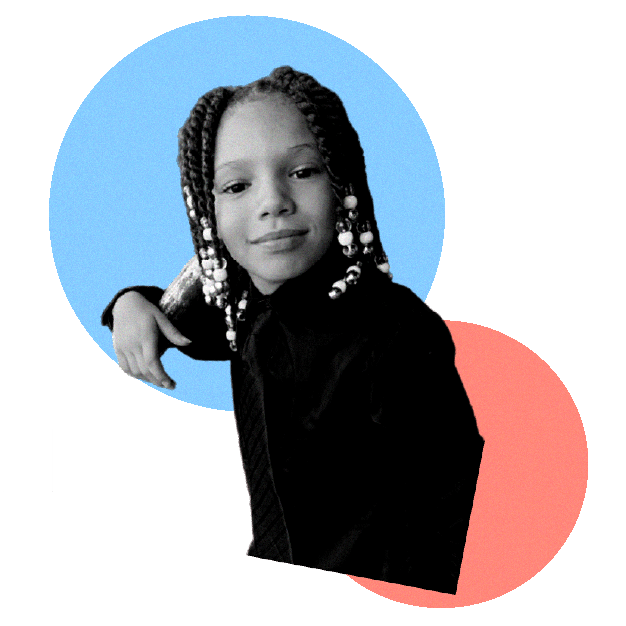
McKenna, 7, North Side
McKenna lives with her mom and two brothers — and a crew of awesome pets, including two dogs, two guinea pigs and a bearded dragon — in Pittsburgh’s North Side. She loves reading and Legos. McKenna has a special talent for calming down her classmates. Since her school is fully virtual right now, she’s been learning at a community learning hub. When McKenna grows up she either wants to rule the world or be a police officer. McKenna hears her mom and adult brother talk about the election and knows they plan to vote for Biden.
She isn’t sure of Trump’s goals for the country, but she is concerned he doesn’t wear a mask. “He doesn’t like Black people, and he only likes rich people.” When she ponders Biden, she notes that she sees him wear a mask and thinks that he cares a lot about Black people. “He likes rich people and poor people.” McKenna gets most of her information about the election from ads she sees on YouTube, about both candidates. They show up amidst the content geared for kids she likes to watch. When listening to these ads, as well as adults around her discussing the election, she has formed the opinion that the most important thing about being the president is to care about people of all skin colors, no matter if they are rich or poor.
If — when — McKenna runs for president, she plans to use “Black Lives Matter” as her slogan.

Josie, 11, Bellevue
Josie loves music from all eras, acting and circus arts such as trapeze and silks. She has a slime shop on Etsy and a YouTube channel. She loves thrift shopping, baking and hanging out with friends. When she is a teen she hopes to work at a boba shop, and when she’s an adult she wants to be a therapist.
Josie has been very observant and involved in the current election. She has been doing virtual school from home all fall, and the two candidates are a hot topic among kids her age on social media. She’s formed some opinions about each candidate’s goals. For Trump? “I think he kind of wants businesses to open up…He wants everybody to forget about coronavirus. I think he might want them to think it’s [the coronavirus] not real.” For Biden? “I feel like he is going to do a lot of things about the Black Lives Matter Movement — very good things about that.” She also likes that he and vice presidential candidate Kamala Harris plan to focus on women’s rights and helping to end the pandemic. She is concerned that Biden wants to raise taxes, and she notes that it was good early in the pandemic that Trump did urge people to stay home and be safe.
Josie has also been very observant about how supporters of candidates act, as she has many people in her life who fall on each side of the political spectrum. Her family has a vacation home in Pymatuning, and she’s noticed in that area that “people who like Trump are really putting it out there…” She notes the many flags and banners she sees for Trump, compared to the small singular Biden signs she mostly sees closer to Pittsburgh. Overall though, she feels like everyone is mad at the other side.
If Josie gets a chance to run for president among her many other pursuits, her slogan would be, “You are you, and nobody can change that.”
Parents
For the parents of the brave kids who agreed to talk to us, interviewing their kids was an eye-opening experience. Travis’s mom, Nicole, didn’t realize her son had adopted such singular views of the candidates. She said people in their family are supporting a variety of candidates. “To be honest, I think my kids must talk about politics at school. They occasionally mention what someone said at school, or a person who had a Biden sign in their yard.” Living in a rural area, the majority of Travis’s friends and their families are supporting Trump, like his parents are. His mom notes though that she rarely votes a straight party ticket and does significant research into the lower offices and propositions on each ballot. “I don’t think they understand the global aspect of politics like we do.” The couple doesn’t discuss the issue of abortion with their boys directly, other than that they believe all children should be given the chance to live life. “I wish we would have sat down and really explained the pros and cons to both sides. I found out in interviewing my son for this that he has a very narrow-minded view of this election that we need to expand up.”

Travis with his mom Nicole and brother Levi.
(Courtesy photo)
McKenna’s mom Kellie is frustrated about the amount of political ads on YouTube — particularly those showing up on videos targeted to young kids. “She scoffs when Trump comes on, but she is listening and making up her own mind.” McKenna has two older brothers, Zeke and Kai. As a college freshman, Kai is of voting age for the first time this election. McKenna hears her mom and Kai discuss the election, but she isn’t around many other adults right now due to the pandemic. Kellie knows McKenna is a diplomat; she’s overheard the second grader lecturing others on proper mask wearing. “I need to expose her more to these current strong women [in office], we have done a lot about historic Black women and Michelle Obama.”
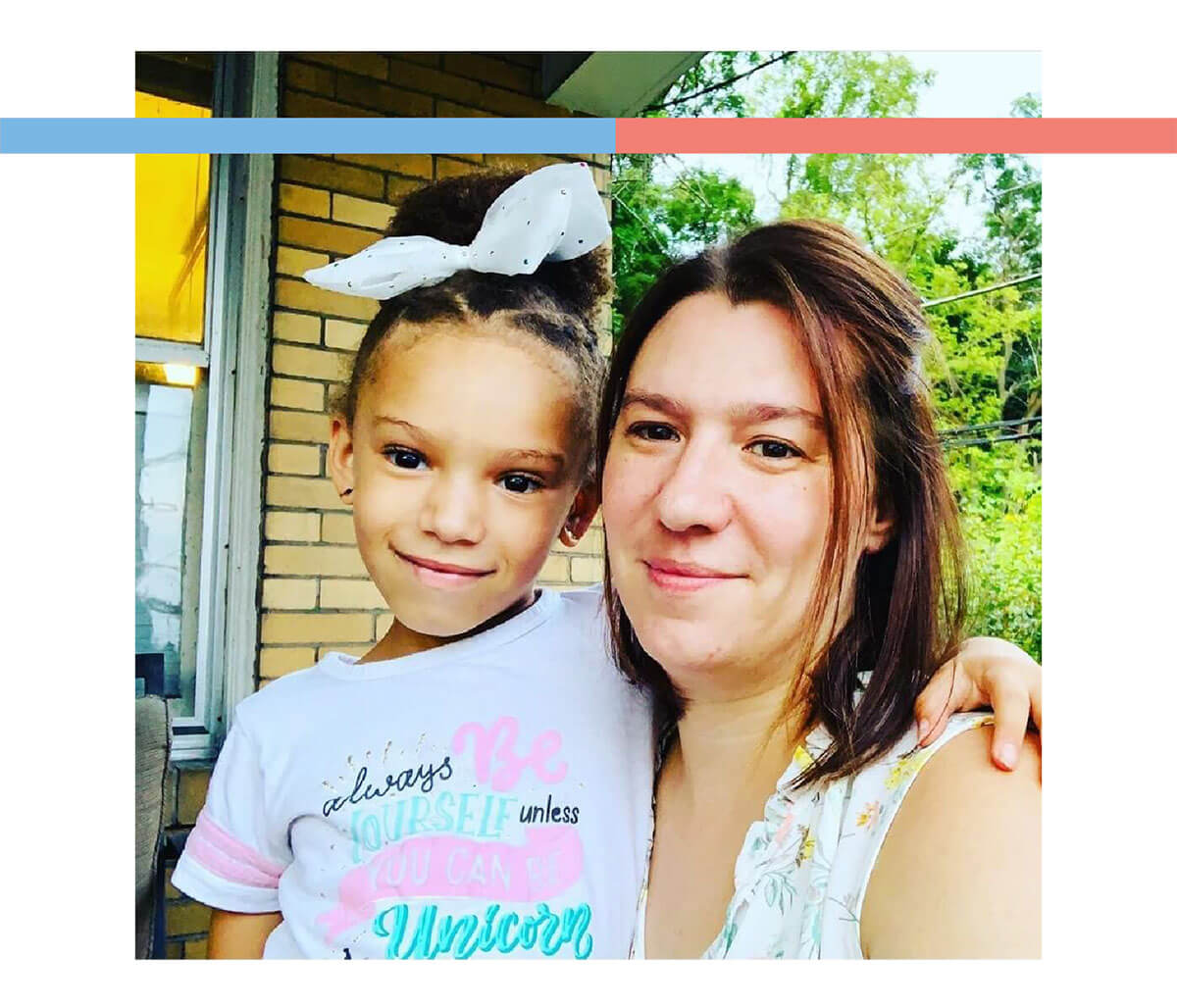
McKenna with her mom Kellie.
(Courtesy photo)
Josie, the oldest kid we talked to, is the daughter of parents who often fall on different sides of the political aisle, though her mom feels “not to extremes.” Josie’s dad Mark is more private with his views while her mom Julie is more vocal. Working from home during the pandemic, while Josie does virtual school, has given her mom a great deal of time with her daughter, and their views tend to align more. But Julie definitely sees Josie seeking out information and forming her own opinions. Josie’s four older siblings — Haley, 26, Evan, 23, Sam, 17, and Charlie, 15 — don’t discuss too much of their political views around their baby sister. Haley believes Josie is perceptive and just picks up on stuff around her, and her mom adds that politics are definitely a hot topic with the kids at (virtual) school.
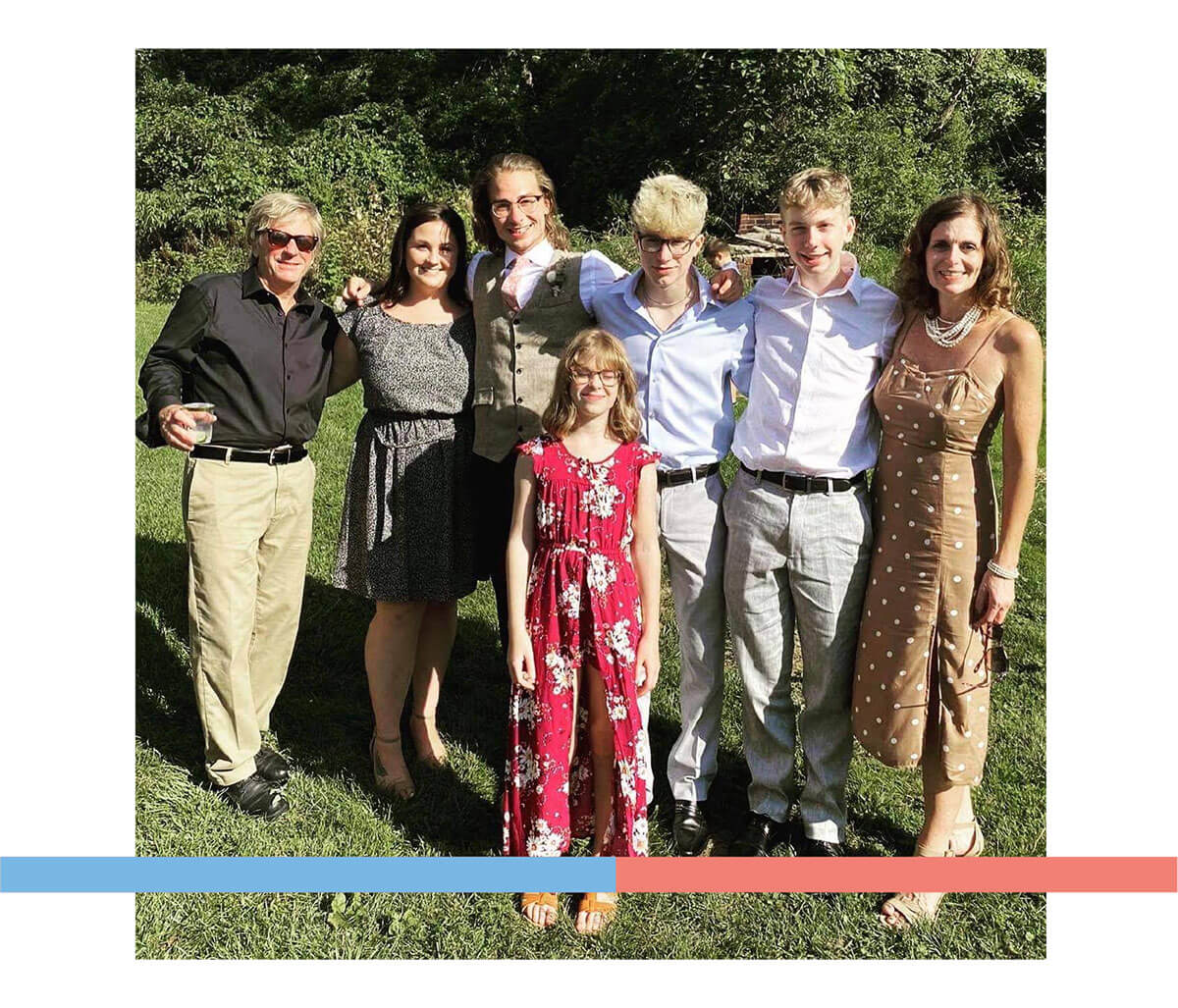
Josie is in front and from left to right: Josie’s dad Mark, sister Haley, brother Evan, Brother Charlie, brother Sam and mom Julie.
(Courtesy photo)
Experts
In a time when kids are bombarded with information, ads, sound bites and opinions, how do parents decide what and how to share? Would many kids surprise their parents if we sat down to interview them, as these families did?
Andrea Barbalich is the editor-in-chief of The Week Junior, a weekly magazine that presents kids with current events in a politically neutral manner. She urges parents to recognize that this is a scary time for kids — more so than any other election. Whether we talk to them about it or not, they are aware of the ways in which the world is topsy-turvey right now, and are looking for guidance from adults they can trust. Barbalich’s publication conducted a survey in conjunction with the data and analytics group YouGov, and found that many kids have formed strong opinions on this political race. Of 700 kids ages 8-12, their answers showed critical thinking about the topics at hand.
Barbalich has spent two decades of her career focusing on how to talk to kids about difficult subjects. She wrote a book about it titled Feeling Safe: Talking to Children about War and Terrorism, and many of the same guidelines in it apply to the current heated political climate. She cautions parents against binary thinking — that our candidate can do only good and the other can do only wrong. Focusing on what issues matter to us is a more positive approach. “Keep the tone positive and factual, with the goal of helping kids feel informed and not panicked or scared.” Many parents are concerned about the tone of the advertisements and the debates, as well. “If children are upset by what they perceive as unfairness or bullying, you can tell them it’s understandable that they feel that way and discuss your family’s values, such as kindness and respect.”
Dr. Tania Kannadan, a Pittsburgh-based child psychiatrist, has seen a dramatic increase in anxiety in the children and teens she works with. It is not tied solely to the election but rather to the intersection of so many major societal stressors right now. “It’s really multifactorial. There is the pandemic — so many children are worried that they will die or kill parents. Then of course the school piece, such an utter disaster on every level, and then we add in the election…” Kannadan notes that kids have more of a front seat to this election than previously, with the amount of time families are spending at home together and the decrease in exposure to other groups who might support different candidates than their parents.
As for how to approach talking about politics with our kids, Kannadan stresses that it is really about what your child can handle. Kannadan doesn’t outline strict age guidelines for these topics, as each kid has a different level of emotional intelligence. Often, in her practice, she sees a shift when kids move into upper elementary/middle school. It’s okay to shelter them a little bit from some of the debate,” she said. “In this election, the vocabulary they use is so sensationalized. It worsens anxiety for many kids.” With older children who are beginning to grasp some more complex points of politics, she encourages parents to be both honest and objective. While Kannadan knows it can be difficult, she urges parents to try to present platform information in a straightforward manner without hyperbole used in many political ads and conversations. Parents can use simple language like, “I am going to be voting. We are exercising our right to democracy, and this is how the government works…”
Kannadan is particularly concerned about kids of color who hear the president’s opposition to racial justice issues, which makes them feel invalidated as individuals. Other topics, like grasping the concept of abortion, are very complex for young children. Kannadan notes that the current political climate is just adding more layers of trauma to an already traumatic time for America’s kids. “If you notice their mental health is suffering,” she said, “it might be time to pull back on some of these discussions.”
Meg St-Esprit is a freelance journalist based in Bellevue. She can be reached at megstesprit@gmail.com or on Twitter @MegStEsprit.
This story was fact-checked by Emily Briselli.
Web design and development by PublicSource Creative Director Natasha Vicens.